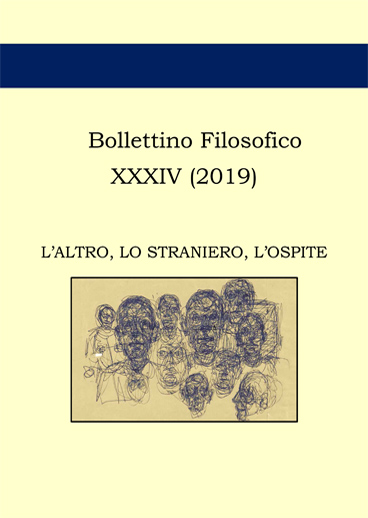L’alterità dell’altra. Levinas, il femminile, l’umanità dell’umano
Abstract
In Levinas’ thought the feminine otherness assumes different connotations and is shrouded in ambiguity. Initially it is assumed as a paradigm of the otherness, then Levinas in Totality and Infinity, especially in the pages about The Dwelling, which have been rightly criticized, attaches a ‘disfigured’ face and a too intimate and familiar relationship with the other (man) to it. According to Jacques Derrida, the most interesting aspect of the strategy by Levinas, which is put in place to reach the radical ‘deposition’ of the Subject, is the hyperbolic revival of some female stereotypes (welcome, vulnerability, maternity), which are assumed in order to characterize the humanity of the Human as such. The otherness of the other (woman) becomes, therefore, the key to the deconstruction of subjectivity and to the understanding of the Human.
Keywords: Emmanuel Levinas, Otherness, Feminine, Gender difference, Politics
Downloads
Bollettino Filosofico pubblica in internet, ad accesso aperto, con licenza:
|
|
CCPL Creative Commons Attribution |
L'autore conserva il copyright sul suo contributo, consentendo tuttavia a chiunque "di riprodurre, distribuire, comunicare al pubblico, esporre in pubblico, rappresentare, eseguire e recitare l'opera", purché siano correttamente citati l'autore e il titolo della rivista. L’autore, al momento della proposta di pubblicazione, è inoltre tenuto a dichiarare che il contenuto e l’organizzazione dell’opera è originale e non compromette in alcun modo i diritti di terzi, né gli obblighi connessi alla salvaguardia di diritti morali ed economici di altri autori o di altri aventi diritto, sia per testi, immagini, foto, tabelle, sia per altre parti di cui il contributo può essere composto. L’autore dichiara altresì di essere a conoscenza delle sanzioni previste dal codice penale e dalle leggi speciali per l’ipotesi di falsità in atti ed uso di atti falsi, e che pertanto Bollettino Filosofico è esente da qualsiasi responsabilità di qualsivoglia natura, civile, amministrativa o penale, e sarà dall'autore tenuta indenne da qualsiasi richiesta o rivendicazione da parte di terzi.
